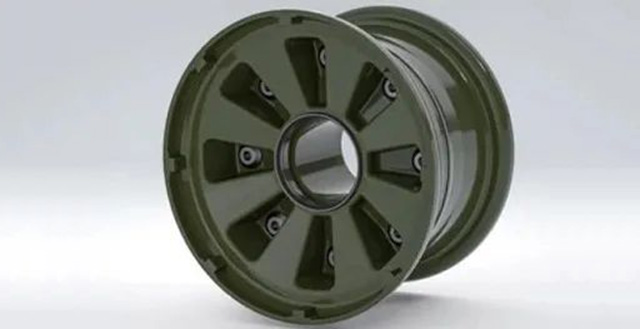Carbon fiber automotive hub supplier Carbon Revolution (Geelung, Australia) has demonstrated the strength and capability of its lightweight hubs for aerospace applications, successfully delivering a nearly-proven Boeing (Chicago, IL, US) CH-47 Chinook helicopter of composite wheels.
This Tier 1 automotive supplier concept wheel is 35% lighter than traditional aerospace versions and meets durability needs, providing an entry point for other vertical lift aerospace and military applications.
The virtual-proven wheels can withstand the CH-47′s maximum takeoff weight of 24,500 kg.
The program presents a great opportunity for Tier 1 automotive supplier Carbon Revolution to extend the application of its technology to the aerospace sector, thereby significantly reducing the weight of aircraft designs.
“These wheels can be offered on new build CH-47 Chinook helicopters and retrofitted to thousands of CH-47s currently in operation around the world, but our real opportunity lies in other civil and military VTOL applications,” relevant personnel explained. “In particular, the weight savings for commercial operators will result in significant fuel cost savings.”
Those involved say the project demonstrates the team’s capabilities beyond the wheel of a car. The wheels are designed to meet the CH-47′s maximum static vertical load requirement of over 9,000kg per wheel. By comparison, a performance car requires about 500kg per wheel for one of Carbon Revolution’s ultra-lightweight wheels.
“This aerospace program brought many different design requirements, and in many cases, these requirements were much more stringent than for automobiles,” the person noted. “The fact that we were able to meet these requirements and still make a lighter wheel is a testament to the strength of carbon fiber, and our team’s talent for designing extremely strong wheels.”
The virtual validation report submitted to the Defense Innovation Center includes results from finite element analysis (FEA), subscale testing, and internal layer structure design.
“During the design process, we also considered other important aspects, such as in-service inspection and the manufacturability of the wheel,” the person continued. “These are critical to ensuring that projects like this are viable in the real world for us and our clients.”
The next phase of the program will involve Carbon Revolution producing and testing prototype wheels, with the potential to expand to other aerospace applications in the future.
Post time: Aug-01-2022


